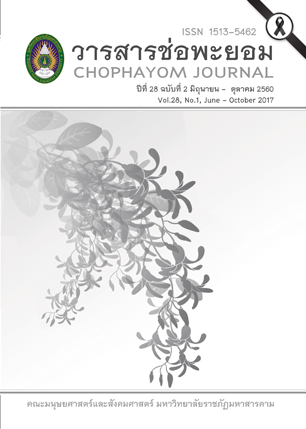รูปแบบการพัฒนาครูเพื่อส่งเสริมพฤติกรรมการจัดการเรียนการสอนที่เน้นผู้เรียน เป็นสำคัญของมหาวิทยาลัยมหาจุฬาลงกรณราชวิทยาลัย วิทยาเขตในภาคตะวันออกเฉียงเหนือ A Model of teacher development for Promotion of Instruction Behavior Student – Centered Learning
Abstract
บทคัดย่อ
การวิจัยนี้มีวัตถุประสงค์ 1) เพื่อศึกษาปัจจัยที่มีผลต่อพฤติกรรมการจัดการเรียนการสอนที่เน้นผู้เรียนเป็นสำคัญของ
มหาวิทยาลัยมหาจุฬาลงกรณราชวิทยาลัย วิทยาเขตในภาคตะวันออกเฉียงเหนือ 2) เพื่อสร้างรูปแบบการพัฒนาครูเพื่อส่งเสริมพฤติกรรมการจัดการเรียนการสอนที่เน้นผู้เรียนเป็นสำคัญของมหาวิทยาลัยมหาจุฬาลงกรณราชวิทยาลัย วิทยาเขตในภาคตะวันออกเฉียงเหนือ 3) เพื่อทดลองใช้และประเมินรูปแบบการพัฒนาครูเพื่อส่งเสริมพฤติกรรมการจัดการเรียนการสอนที่เน้นผู้เรียนเป็นสำคัญของมหาวิทยาลัยมหาจุฬาลงกรณราชวิทยาลัย วิทยาเขตในภาคตะวันออกเฉียงเหนือ วิธีดำเนินการวิจัยแบ่งเป็น 3 ระยะ คือ ระยะที่ 1 เป็นการวิจัยเชิงปริมาณ เพื่อศึกษาปัจจัยที่มีผลต่อพฤติกรรมการจัดการเรียนการสอนที่เน้นผู้เรียนเป็นสำคัญของมหาวิทยามหาจุฬาลงกรณราชวิทยาลัย วิทยาเขตในภาคตะวันออกเฉียงเหนือ กลุ่มตัวอย่างคือ ครูสังกัดมหาวิทยาลัยมหาจุฬาลงกรณราชวิทยาลัย วิทยาเขตในภาคตะวันออกเฉียงเหนือ จำนวน 303 คน กลุ่มตัวอย่างได้มาจากสุ่มตามระดับชั้น อย่างเป็นสัดส่วน Proportional Stratified Random Sampling ใช้วิธีการจัดชั้นภูมิ (Strata) ของหน่วยตัวอย่าง แยกตามรายวิทยาเขต โดยการคำนวณหาสัดส่วนหน่วยตัวอย่างในแต่ละวิทยาเขต ขั้นตอนที่ 2 เป็นการสุ่มอย่างมีระบบ แบบ Systematic Random Sampling หาหน่วยตัวอย่าง เครื่องมือที่ใช้เป็น แบบสอบถาม วิเคราะห์ข้อมูลโดยใช้รูปแบบการวิเคราะห์สมการโครงสร้างเชิงเส้น (Structural Equation Model : SEM) โดยใช้โปรแกรมลิสเรล (LISREL for windows) เพื่ออธิบายอิทธิพลเส้นทางด้วย (Path Analysis) หรือปัจจัยเชิงสาเหตุที่มีอิทธิพลทั้งโดยตรงและโดยอ้อมต่อตัวแปรตาม ในการตรวจสอบแบบจำลองกับข้อมูลเชิงประจักษ์ ระยะที่ 2 เป็นการวิจัยเชิงคุณภาพ เพื่อสร้างรูปแบบการพัฒนาครูเพื่อส่งเสริมพฤติกรรมการจัดการเรียนการสอนที่เน้นผู้เรียนเป็นสำคัญของมหาวิทยาลัยมหาจุฬาลงกรณราชวิทยาลัย วิทยาเขตในภาคตะวันออกเฉียงเหนือ กล่มุเป้าหมาย คือ ผู้บริหารดีเด่น ผู้เชี่ยวชาญด้านการศึกษา ครูผู้สอนดีเด่น ครูต้นแบบ ครูแกนนำและตัวแทนนักเรียนดีเด่น จำนวนกลุ่มละ 5 คน จากมหาวิทยาลัยมหาจุฬาลงกรณราชวิทยาลัย กลุ่มตัวอย่างได้มาจาก สุ่มอย่างง่าย รวมทั้งสิ้นจำนวน 30 คน ระยะที่ 3 เป็นการทดลองใช้และประเมินผลการใช้รูปแบบการพัฒนาครูเพื่อส่งเสริมพฤติกรรมการจัดการเรียนการสอนที่เน้นผู้เรียนเป็นสำคัญของมหาวิทยามหาจุฬาลงกรณราชวิทยาลัย วิทยาเขตในภาคตะวันออกเฉียงเหนือ กลุ่มทดลอง คือ ครูสังกัดมหาวิทยาลัยมหาจุฬาลงกรณราชวิทยาลัย วิทยาเขตหนองคาย จำนวน 32 คน ใช้วิธีการเลือก สุ่มอย่างง่าย สถิติที่ใช้ MANOVA (Repeated Measure) กำหนดระดับนัยสำคัญที่ .05 ผลการวิจัยปรากฏ ดังนี้ 1. แบบจำลองความสัมพันธ์เชิงสาเหตุ มีความกลมกลืนกับข้อมูลเชิงประจักษ์ โดยตัวแปรเชิงสาเหตุส่งผลโดยตรงและโดยอ้อมต่อตัวแปรตามคือพฤติกรรมการจัดการเรียนการสอนของครูในมหาวิทยาลัยมหาจุฬาลงกรณราชวิทยาลัย ที่ระดับนัยสำคัญที่ .05 พบว่ามี 3 ตัวแปร คือ ปัจจัยด้านการเพิ่มศักยภาพครู ด้านความพึงพอใจในการทำงานของครูและด้านการสนับสนุนการทำงานของครู 2. รูปแบบการพัฒนาพฤติกรรมการจัดการเรียนการสอนของครูในมหาวิทยาลัยมหาจุฬาลงกรณราชวิทยาลัย ประกอบไปด้วย กิจกรรมในการพัฒนา จำนวน 14 กิจกรรม คือ 1) กิจกรรม การประชุมเชิงปฏิบัติการ 2) กิจกรรม การศึกษาดูงาน 3) กิจกรรม การประชุมทบทวนความรู้ นำเสนอผลการพัฒนางาน 4) กิจกรรม การประเมินผล 5) กิจกรรม การสรุปผล 6) กิจกรรมการรู้จักตัวเอง 7) กิจกรรม บทบาทและหน้าที่ของครูผู้สอน 8) กิจกรรม บทบาทสมมติ ”ครู และนักเรียน” 9) กิจกรรม การประชุมชี้แจง 10) กิจกรรม การวางแผน 11) การปฏิบัติตามแผน 12) ได้วิธีการเสริมความรู้ 13) ประเมินผล และ 14) สรุปผล 3. การประเมินผลก่อนและหลังการดำเนินงานตาม รูปแบบการพัฒนาพฤติกรรมการจัดการเรียนการสอนของครูในมหาวิทยาลัยมหาจุฬาลงกรณราชวิทยาลัย พบว่า หลังการทดลองกล่่มทดลอง มีการพัฒนาพฤติกรรมการจัดการเรียนการสอนของครูในมหาวิทยาลัยมหาจุฬาลงกรณราชวิทยาลัย ได้ดีขึ้น กว่าก่อนการทดลอง อย่างมีนัยสำคัญทางสถิติที่ระดับ .05 ทั้งการทดสอบโดยรวม (Multivariate Test) และการทดสอบทีละตัวแปร (Univariate Test)
ABSTRACT
This research aimed 1) to analyze causal factors affecting the Promotion of Instruction Behavior Student – Centered Learning of teacher in Mahachulalongkornrajavidyalaya University North - Eastern Campus, 2) to design a model of teacher development for Promotion of Instruction Behavior Student – Centered Learning of teacher in Mahachulalongkornrajavidyalaya University North - Eastern Campus, and 3) to implement and evaluate the developing model for the Promotion of Instruction Behavior Student – Centered Learning of teacher in Mahachulalongkornrajavidyalaya University North - Eastern Campus. The research methodology was divided into 3 phases. 1) analysis of causal factors, 2) design of a model and 3) implementation and evaluation of a new model. Phase 1 focused on analyzing causal factors that the Promotion of Instruction Behavior Student - Centered Learning in Mahachulalongkornrajavidyalaya university North - Eastern campus through quantitative research, and analyzing the relationships between the causal factors to the empirical data. The target population of consisted 303 teacher in Mahachulalongkornrajavidyalaya university North - Eastern campus. The data were collected by questionnaires. LISREL for windows was used to analyze a structural equation model.
The causal factors affecting the dependent variables were analyzed with the empirical data. Phase 2 focused on designing a model of developing model for the Promotion of Instruction Behavior Student - Centered Learning in Mahachulalongkornrajavidyalaya university North - Eastern campus based on the data of phase 1. The model was designed through workshop of 30 participants. The focus group method was employed for discussion on the Model of teacher development Student - Centered Learning, and the developed model was assessed by 3 experts. Phase 3 focused on implementing and evaluating the model. The model was
implemented to 32 experimental participants, and the model evaluation was identified by the comparison of the research results before and after model implementation, and the comparison of the results of the experimental groups. Multivariate Analysis of Covariance was employed for data analysis. The major findings were as follows: 1. According to the analysis of the relationship and the empirical data, the finding showed that 3 factors significantly affected the promotion of Instruction Behavior Student - Centered Learning at the .05 level. The factors were Add Potential, Satisfy, and Support. 2. The developing model for the behavior promotion of instructional Student - Centered Learning in Mahachulalongkornrajavidyalaya University North - Eastern campus consisted of 14 activities : 1) Workshop, 2) Observe activities, 3) Knowledge Review, 4) Evaluation, 5) Summary, 6) Self, 7) Teacher Role, 8) Assume Role, 9) Conference, 10) Planning, 11) Action, 12) Knowledge supplement 13) Evaluation, and 14) Summary. 3. The research finding indicated that the mean score of teacher development for the promotion of Instruction behavior Student - Centered Learning of the experimental groups after the model implementation towards the behavior promotion of instructional Student - Centered Learning significantly improved more than before the model implementation at the .05 level of statistical significance both Multivariate Test and Univariate Test.






